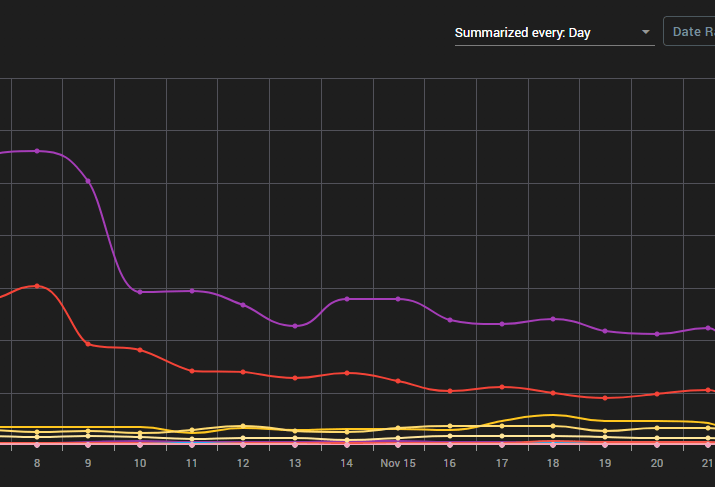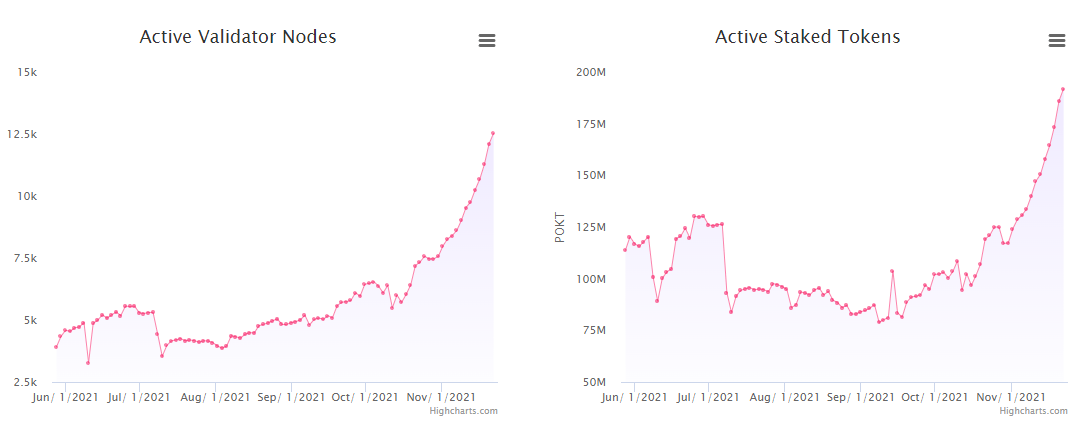01:1 Introduction
Someone once told me “Never sweat the petty stuff, and never pet the sweaty stuff.” I’ve managed the former pretty well, but the latter is questionable.
Hi. I’m The Poktopus. I’ll skip the formal introductions, but you can find my personal account and disclosures here:
Disclosures:
– I am not a Pocket team member, but I am a noderunner, and have been part of Pocket's advisory board since 2017. Personal account is @ImMrDubious
– I am not paid by Pocket Network, inc. for tweets here. They are my and the community's opinions.— Poktopus 🐙 (@thepoktopus) November 3, 2021
The last thing the world needs is another crypto blog, but here I am anyways. In the last few weeks, I’ve been frequently asked my opinions on topics related to decentralized crypto in general, and Pocket Network specifically, so I figured it would end up saving me time if I had somewhere to point to with my current takes on the topics du jour. Current mood? Bullish AF.
What you can expect from me:
- Opinions on features, releases, announcements, and the general state of the market around Pocket ($POKT and the soon to be launched wPOKT).
- My positions on proposals to the Pocket DAO (of which I am a governor).
- Opinions on blockchain at large, of which I’m a fan without being a maxi.
- Maybe, if you’re good little kiddies, some giveaways, and a little alpha on the projects I follow, especially Pocket.
I cannot emphasize enough that I am not an investment advisor, and nothing in here should be construed as financial advice.
I’ve had some wins in crypto because I’m a technophile who joins every group and reads every blog, not because I’m an investing genius. While I have some strong opinions, and will share them, you should always always always DYOR.
Now that that’s all out of the way, here are some things to keep an eye on this week:
01:2 Harmony Relays
There’s been a ton of speculation around the drop in Harmony relays on the Pocket Network, which is pretty reasonable given the noticeable impact on total network relays. On Friday, the team gave an update in the monthly community call and weekly relay roundup:
Working with Harmony, Pocket engineers opted to exclude Pocket from the rotation while the team investigates an issue with the public RPC’s configuration, in which it expects the block height of a node it’s calling to be the same as the last node it called, even if it’s calling historical data for which recent blocks aren’t relevant.
This type of behavior is predictably going to have a hard time using a diverse network of nodes. However, it is not inevitable; as far as we can tell, all other Harmony apps are still using Pocket, because they don’t rely on this same “stickiness”.
The Pocket engineering team continues to work with the Harmony team in investigating this issue and see if the Portal can replicate the stickiness that Harmony’s public RPC expects. When that effort is successful, Harmony’s public RPC will be able to reinstate Pocket into the public RPC rotation and continue giving Pocket a larger chunk of the traffic for nodes to serve.
The public endpoint with the issue turned off routing to Pocket on November 9th, and total relays dropped visibly by the next day, settling around 100MM. Harmony dapps staked on Pocket were unaffected, and Pocket continues to serve up around 40MM Harmony relays per day (Harmony in purple):
The team mentioned on the community call that they were testing a fix over the weekend that may provide the “stickiness” the public endpoint requires, so the noderunner community is holding their breath and waiting for an update from the engineering team this week. Harmony and Pocket have closely aligned communities, so we’re eager to ramp relay service back up.
01:3 Community, Ecosystem and Governance
The Pocket community was out in full force last week, with nearly 150 attendees to the monthly meetup, and a record number of views and comments on the governance forum. There are a handful of DAO proposals currently open for community review, including some important ones around splitting servicing and validation on nodes, and the adoption of Coordinape for vouching and contributions.
Of particular interest is a proposal (which I highly support) for compensating community member Pierre for his outstanding work on poktwatch, a Pocket blockchain explorer. The existing explorer has been suffering from neglect, and poktwatch is lining up to be a far superior replacement.
One of the things that I love so much about open source, and especially blockchain based open source projects, is that often the best tooling comes out of necessity from the users of the core product, based on their vested use of the product. Poktwatch is another example of the significant dev community support of the protocol.
There is massive demand for bare metal and cloud providers in the Pocket community right now, as significant staking activity combined with rising hardware prices and supply chain issues have swamped a number of third party node runner services. Staked nodes have nearly doubled since last month to over 12.5K, with 192MM pokt staked on the network.
01:4 /dev/null
I’ve been thinking a lot lately about developing for decentralization, for obvious reasons. It just really struck me how we’re reaching a place in web3 that I watched happen in real time with web2: the ability for a dev to sit down in an afternoon and choose from a broad spectrum of highly specialized providers to build a globally scalable distributed application without having to spend a single second worried about the underlying infra. That’s freaking awesome.
Pull up a chair around the campfire, kiddos. It's story time. Back when I first got into technology, if you want to build a web app, you had a handful of hosting providers to choose from that would handle everything: web service, database, bandwidth, the works. 1/
— Poktopus 🐙 (@thepoktopus) November 16, 2021
But as I outlined in this tweet, that very ability to not HAVE to think about the underlying infra leads to many devs that don’t, which means they don’t bake scale protection into their architecture from the beginning. Blockchain is awesome, but it’s not magic, and there are a number of choke points possible if you don’t plan for success. Dapp developers seek out solutions when they hit performance or congestion issues, but if they built solutions for those problems into their core using decentralized providers, the problems of scale become a scraped knee instead of a broken leg. I’m looking forward to seeing more pure “serverless” development in the blockchain space.
That’s all for this week. Got questions about anything I write? Follow me on Twitter and @ or DM me.


